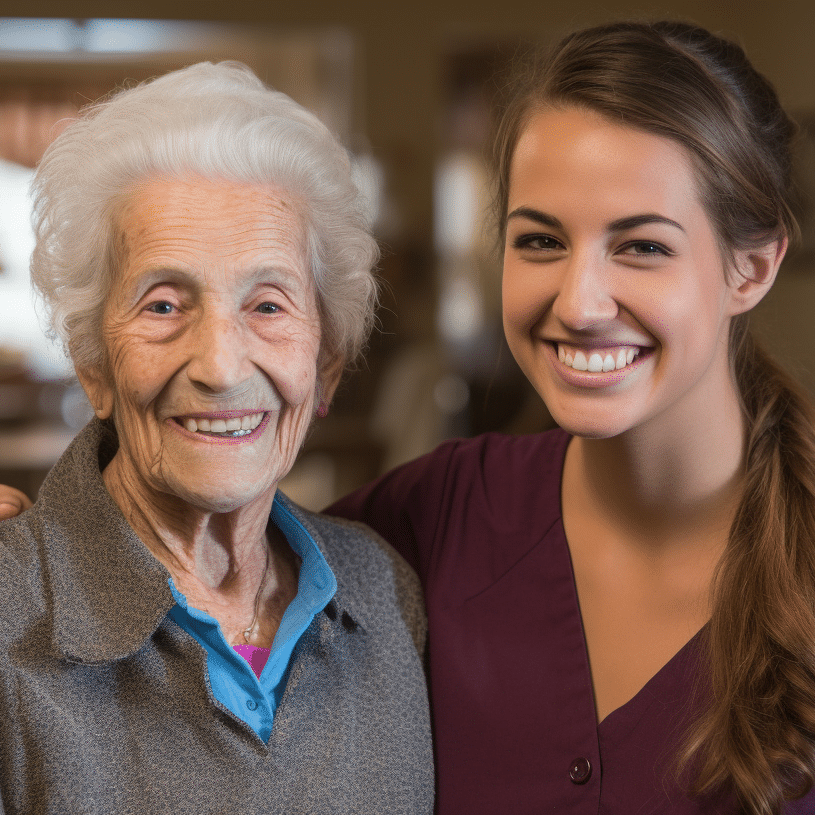Are you feeling overwhelmed, exhausted, and in need of support as a family caregiver? Look no further! In this article, we will provide you with a comprehensive guide to Family Caregiver Resources in the U.S. From federal programs and state-specific support to respite care services and financial assistance, we’ll equip you with the knowledge and resources you need to navigate this challenging journey. It’s time to find the freedom and support you deserve. Let’s get started!


You’ll be glad to know that there are several federal programs and resources available to support family caregivers in the U.S. Being a family caregiver can be challenging, but you don’t have to face it alone. The government understands the essential role you play in providing care and is committed to assisting you through various initiatives.
One of the primary resources available is the Family Caregiver Support Program (FCSP). This program, administered by the Administration on Aging, aims to empower and support family caregivers by providing access to services, information, and resources. Through FCSP, you can access respite care, counseling, support groups, and training to enhance your caregiving skills. These services can help alleviate stress and prevent caregiver burnout, ensuring that you can continue providing quality care for your loved ones.
Another valuable resource for family caregivers is the Family Caregiver Alliance (FCA). FCA is a national nonprofit organization that provides education, advocacy, and support for caregivers. They offer online resources, webinars, and caregiver support groups to connect you with others who understand your journey. FCA’s mission is to improve the quality of life for caregivers and ensure that their contributions are recognized and valued.
These federal programs and resources are designed to empower you, the family caregiver, and provide you with the support you need. They recognize the vital role you play in our society and aim to ensure that you have access to the assistance and resources necessary to navigate your caregiving journey. Remember, you are not alone, and help is available to you.


When searching for state-specific caregiver support, it’s important to consider the available resources in your area. Each state in the U.S. offers a variety of programs and services to assist family caregivers. These resources can provide much-needed support and guidance, allowing you to navigate your caregiving journey with confidence. To help you find the information you need, here is a table highlighting some key resources for caregivers in each state:
This table provides just a glimpse of the resources available in each state. To find more detailed information, you can visit the official websites of your state’s Department of Aging, Department of Health, or Department of Human Services. Additionally, local non-profit organizations and support groups can also offer valuable assistance and connections to resources. Remember, being a family caregiver can be challenging, but you don’t have to face it alone. Take advantage of the state-specific caregiver support available to you and ensure you have the help and resources you need. You deserve the freedom to care for your loved ones while also taking care of yourself.

Now that you have learned about financial assistance for caregivers, it is important to also consider the legal and estate planning resources available to you in the United States. These resources can help you navigate the complex legal and financial aspects of caregiving, ensuring that you and your loved ones are protected.
When it comes to legal matters, it is crucial to have the necessary legal documents in place. This includes having a power of attorney, which grants you the authority to make decisions on behalf of your loved one, and a healthcare proxy, which allows you to make medical decisions for them. These documents provide you with the legal authority to act in their best interest, ensuring that their wishes are respected.
In addition to legal documents, estate planning is also an important consideration for family caregivers. Estate planning involves creating a plan for how your loved one’s assets will be managed and distributed after their passing. It can include creating a will, establishing a trust, or designating beneficiaries for retirement accounts and life insurance policies.
To access these legal and estate planning resources, you can consult with an attorney who specializes in elder law or estate planning. They can provide you with expert advice and guidance tailored to your specific situation. Additionally, many nonprofit organizations and government agencies offer free or low-cost legal assistance to family caregivers.
Financial assistance can provide caregivers with the support they need to alleviate some of the financial burdens associated with caregiving. As a family caregiver, you devote your time and energy to taking care of your loved ones, but it’s important to remember that you also need to take care of yourself. Here are some resources that can help you find the financial assistance you deserve:
Grants and Scholarships: There are various organizations and foundations that offer grants and scholarships specifically for caregivers. These financial resources can help cover expenses such as medical bills, respite care, and home modifications. Research and apply for these grants to help ease your financial stress.
Government Programs: The government provides several programs that offer financial assistance to family caregivers. Medicaid, for example, may cover some of the costs associated with caregiving, such as home health aides and medical equipment. Additionally, the Family and Medical Leave Act (FMLA) allows eligible caregivers to take unpaid leave from work without the fear of losing their job.
Nonprofit Organizations: Many nonprofit organizations offer financial assistance programs for family caregivers. These organizations understand the challenges you face and provide resources to help ease the financial burden. They may offer financial aid, counseling services, or even support groups to connect you with others who are going through similar experiences.

Respite care services provide you, the caregiver, with the opportunity to take a much-needed break and recharge. As a caregiver, you play a vital role in supporting your loved one, but it’s important to remember that you also need time for yourself. Respite care offers you the freedom to take care of your own needs, knowing that your loved one is in good hands.
The National Family Caregiver Support Program recognizes the significant contributions that caregivers make and provides resources to assist them. One of these resources is respite care, which offers temporary relief from caregiving responsibilities. Respite care can take various forms, including in-home care, adult day care centers, or even short-term stays in assisted living facilities. These services ensure that your loved one receives the care they need while you take a break.
Adult day care centers are a popular option for respite care. They provide a safe and stimulating environment for your loved one to socialize and engage in activities, while you have the freedom to run errands, attend appointments, or simply take a well-deserved break. These centers often offer a range of services, such as meals, transportation, and assistance with daily activities.
Respite care services not only benefit you, but they also benefit your loved one. It allows them to interact with other individuals, reducing feelings of isolation and providing a change of scenery. Additionally, respite care can prevent caregiver burnout, ensuring that you are able to continue providing quality care in the long run.
If you are caring for someone with a specific disease, there are specialized resources available to provide you with the information, guidance, and support you need. When it comes to diseases like dementia and Alzheimer’s disease, family caregiving can be challenging, but you are not alone. Here are some resources that can help you navigate this journey:
Alzheimer’s Association: This organization offers a wide range of resources for caregivers of individuals with Alzheimer’s disease. They provide information about the disease, tips for caregiving, and support groups where you can connect with others who are going through similar experiences. Their website also has a helpline you can call for personalized support and guidance.
National Institute on Aging: The National Institute on Aging is a reliable source of information for caregivers. They offer resources specific to dementia and Alzheimer’s disease, including educational materials, tips for managing symptoms, and information about available treatments. They also fund research studies that can provide valuable insights into the disease.
Local Support Groups: Connecting with local support groups can be incredibly beneficial for caregivers. These groups provide a safe space where you can share your experiences, learn from others, and receive emotional support. You can find local support groups through organizations like the Alzheimer’s Association or by reaching out to your healthcare provider.
Support is available for veterans and military families through various organizations and government programs. As a veteran or a member of a military family, you have access to resources that can help you navigate the challenges you may face. Here are three key organizations and programs that can provide you with the support you need:
AARP: The AARP, formerly known as the American Association of Retired Persons, offers a wide range of resources and support specifically tailored for veterans and military families. They provide information on benefits, financial planning, healthcare options, and advocacy for veterans’ rights. Their website is a valuable source of information and their dedicated helpline can connect you with a knowledgeable representative who can assist you with your specific needs.
National Alliance for Caregiving: The National Alliance for Caregiving is an organization that focuses on supporting family caregivers, including those within the military community. They offer resources and programs designed to assist caregivers in their role, providing information on caregiving techniques, self-care strategies, and connecting caregivers with support groups in their local area.
Department of Health: The Department of Health is a government agency that provides a wide range of services and support for veterans and military families. They offer healthcare services, mental health support, and assistance with accessing benefits and resources. They also have programs specifically aimed at supporting military families, such as counseling services for children and spouses of veterans.

Take a moment to prioritize your own mental health and emotional well-being as a caregiver, ensuring that you are taking care of yourself in order to better support your loved one. As a caregiver, it is easy to put your own needs aside and focus solely on the well-being of your family member or friend. However, it is important to remember that you cannot pour from an empty cup. By taking care of yourself, you can be better equipped to provide the care and support your loved one needs.
In the United States, there are various resources available to support the mental health and emotional well-being of caregivers. These resources aim to provide caregivers with the necessary tools, information, and support to manage their own well-being while caring for others. Here is a table highlighting some caregiver support services available:
Education and training are essential for caregivers to gain the necessary skills and knowledge to provide the best care possible. As a caregiver, you play a vital role in supporting your loved ones in their daily activities and ensuring their overall well-being. Here are three reasons why investing in education and training is crucial for you:
Improved quality of care: By acquiring proper education and training, you can enhance your caregiving skills and knowledge. This will enable you to provide better care to your loved ones, ensuring their safety, comfort, and happiness. Learning about topics such as medication management, nutrition, and communication techniques can significantly improve the quality of care you provide.
Access to resources and support: Education and training provide an opportunity to connect with other caregivers in the caregiving community. This network can offer valuable resources, advice, and emotional support. Additionally, it can provide access to adult day care services, which offer a safe and engaging environment for your loved ones while you take a break or attend to other responsibilities.
Increased confidence and empowerment: Education and training empower you as a caregiver. It equips you with the necessary tools and knowledge to handle challenging situations and make informed decisions regarding eldercare. With this confidence, you can better advocate for your loved ones’ needs, navigate healthcare systems, and ensure they receive the best possible care.

When making home modifications, consider the accessibility resources available to you. As a family caregiver, it’s important to create a safe and comfortable environment for your loved one. Home modifications can greatly enhance their quality of life and promote their independence. There are a variety of caregiver resources and accessibility resources that can assist you in this process.
Firstly, it’s crucial to assess the specific needs of your loved one. Consider their mobility limitations and any potential hazards in the home. This will help you determine the necessary modifications to make. From there, you can explore the caregiver resources and accessibility resources that are available to you.
One valuable resource is the National Resource Center on Supportive Housing and Home Modification. They provide information on funding options, grants, and loans for home modifications. Additionally, they offer guidance on finding contractors who specialize in accessible home modifications.
Another helpful resource is the Aging and Disability Resource Centers (ADRCs) located throughout the country. These centers offer information and support to caregivers, including guidance on home modifications and accessibility resources in your local area.
Furthermore, it’s important to consider the Americans with Disabilities Act (ADA) guidelines when making home modifications. These guidelines ensure that public spaces are accessible to individuals with disabilities. By incorporating ADA guidelines into your home modifications, you can create an environment that promotes freedom and independence for your loved one.
Now that you have explored disease-specific caregiver resources, let’s dive into the world of technology and assistive devices that can greatly support you in your caregiving journey. The National Family Caregiver Support Program, in collaboration with the National Family Caregivers Association and the Caregiver Action Network, recognizes the importance of technology in easing the caregiving burden.
In today’s digital age, technology offers a wide range of solutions to help you in your caregiving role. There are various mobile applications available that can assist with medication management, appointment scheduling, and tracking vital signs. These apps can help you stay organized and ensure that your loved one is receiving the necessary care they need.
Additionally, there are numerous assistive devices designed specifically for caregivers. For example, lifting and transferring devices can help you move your loved one safely and comfortably, reducing the risk of injury for both of you. Remote monitoring systems allow you to keep an eye on your loved one’s health remotely, providing peace of mind when you cannot be physically present. Voice-activated assistants can also be a valuable resource, helping you with tasks such as setting reminders or finding information quickly.
It’s important to remember that technology should not replace human connection and care, but rather complement and enhance it. As a family caregiver, you have the freedom to explore and utilize these technological resources to make your caregiving journey more manageable and efficient.
The National Family Caregiver Support Program, National Family Caregivers Association, and Caregiver Action Network are dedicated to providing you with the knowledge and support you need to navigate the world of technology and assistive devices. They offer resources, webinars, and support groups to ensure that you are well-equipped to leverage these tools effectively. Remember, you are not alone in this journey, and there are resources available to help you every step of the way.

Consider exploring end-of-life planning and palliative care resources to ensure that your loved one’s needs and wishes are met during this challenging time. Making decisions about end-of-life care can be difficult, but having access to the right resources can help guide you through the process. Palliative care focuses on providing relief from the symptoms and stress of a serious illness, with the goal of improving quality of life for both the patient and their family.
End-of-life planning involves discussing and documenting your loved one’s preferences for medical treatments, such as resuscitation, ventilation, and pain management. It also includes important legal documents, such as a living will and a healthcare proxy, which designate someone to make medical decisions on your loved one’s behalf if they are unable to do so themselves. These resources can help ensure that your loved one receives the care they want, even if they are unable to communicate their wishes.
Palliative care resources provide support and guidance for both the patient and their family. They can help manage pain and other symptoms, provide emotional and spiritual support, and assist with navigating the healthcare system. These resources may include palliative care teams, hospice services, counseling services, and support groups. Additionally, there are online resources available that provide information and tools for end-of-life planning and palliative care.
Exploring self-care practices can help caregivers like you prevent burnout and maintain your well-being during this challenging time. As a caregiver, it’s essential to prioritize your own needs and take steps to ensure your physical, mental, and emotional health. Here are three self-care practices that can help you on your caregiving journey:
Prioritize Self-Care: Make self-care a non-negotiable part of your routine. Take time for yourself each day, even if it’s just a few minutes to relax or engage in an activity you enjoy. Remember, you cannot pour from an empty cup, so taking care of yourself is crucial for providing the best care for your loved one.
Seek Support: Reach out for support from others who understand what you’re going through. Join a caregiver support group, either in person or online, where you can connect with people who share similar experiences and find comfort in knowing you’re not alone. Additionally, consider talking to a therapist or counselor who specializes in caregiver support.
Utilize Resources: Take advantage of available resources and tools that can make your caregiving journey more manageable. Look for local organizations that offer respite care services, which provide temporary relief for caregivers. Explore online platforms that offer educational resources, caregiver forums, and practical tips to help you navigate the challenges of caregiving.
You may find it beneficial to join caregiver support groups and online communities to connect with others who understand your experiences and can offer support and advice. Caregiving can be a challenging and isolating journey, but by reaching out to these resources, you can find a sense of community and gain valuable insight. Here are three reasons why engaging in caregiver support groups and online communities can make a significant difference in your life:
Share Similar Experiences: Being a family caregiver can often feel overwhelming, but connecting with others who are going through similar situations can provide much-needed validation and understanding. In support groups and online communities, you can share your challenges, triumphs, and concerns, knowing that others truly comprehend what you’re going through.
Receive Emotional Support: Caregiving can be emotionally draining, and it’s crucial to have a safe space where you can express your feelings without judgment. Support groups and online communities offer an empathetic environment where you can vent, seek advice, and receive encouragement from individuals who are also caregivers.
Access Valuable Resources: Support groups and online communities are excellent sources of information and resources. Members often share valuable tips, strategies, and recommendations for services or products that can make your caregiving journey more manageable. Additionally, these platforms can provide access to expert advice and educational materials on various caregiving topics.
Yes, there are resources available specifically for caregivers of individuals with Alzheimer’s disease. These resources can provide support, information, and guidance to help you navigate the challenges of caregiving. They may include support groups, educational materials, online forums, and helplines. These resources aim to empower you with knowledge, connect you with others in similar situations, and offer practical strategies to manage the unique needs of individuals with Alzheimer’s. Remember, you are not alone on this journey, and there are resources out there to assist you.
Financial assistance programs for caregivers can be a game changer! There are various options available to help ease the financial burden. Medicaid offers programs like Cash and Counseling, which provide direct payments to caregivers. The Department of Veterans Affairs also has programs like Aid and Attendance that can provide financial assistance to caregivers of veterans. Additionally, some states offer respite care programs that can give you a much-needed break while someone else cares for your loved one. These programs can truly be a lifeline for caregivers like you!
Looking for support groups in your local area? You’re not alone. Many caregivers like yourself are seeking resources and connections. Fortunately, there are various places where you can find information on support groups. Start by reaching out to your local hospital or healthcare provider—they often have resources and can provide recommendations. Additionally, organizations like the Alzheimer’s Association or the American Cancer Society can offer valuable information and support. Remember, finding a support group can provide a sense of community and understanding during your caregiving journey.
Are you a caregiver looking for some relief? Well, you’re in luck! There are federal programs that provide respite care services just for caregivers like you. These programs give you a chance to take a break and recharge while someone else takes care of your loved one. It’s a much-needed lifeline for those who dedicate their time and energy to caring for others. So go ahead, explore these programs and give yourself the freedom you deserve.
Assistive devices can be a real game-changer for caregivers like you. They’re designed to make your daily tasks easier and more manageable. From simple tools like grabbers and reachers to more advanced technology like smart home systems and medication reminders, there’s a wide range of options available. These devices can help you with everything from bathing and dressing to monitoring your loved one’s health. Don’t hesitate to explore what’s out there and find the ones that suit your needs best. You deserve all the support you can get.
Looking for In-Home Care?
Get Your Free Home Care Price Quote!
No Phone Call Required.
No Credit Card Required.
Instant Information.
No Obligation.
Free For a Limited Time.
